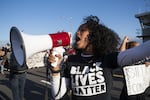
Oria Boyd, 16, speaks into the bullhorn at a protest against police brutality on June 3, 2020.
Jonathan Levinson / OPB
Oria Boyd, 16, Portland
When Oria Boyd took the microphone to talk with Portland police officer Matt Jacobsen through a fence, she asked him whether her life mattered as much as his.
Jacobsen said yes and that he was there to facilitate a “safe and peaceful expression of speech.”
Boyd, a 16-year-old sophomore at Benson Polytechnic High School, didn’t expect anyone to listen to her or her question. Self-described as shy, she surprised herself too. But she wants to see change.
“I’m really angry, I’m really upset — I’m tired that this keeps on happening to us,” Boyd said. “I’m grateful that I have this voice to use for our people, but at the same time, I shouldn’t be doing this, I shouldn’t have to stick up for Black people, we shouldn’t have to be doing this still.”

Bradley W. Parks / OPB
Boyd grew up in Indiana, moving to Portland in 2016. She’s on the basketball team at Benson — in the past, the team kneeled in solidarity with NFL player Colin Kaepernick.
Boyd was nervous about protesting. She has family in the military and in law enforcement and didn’t want to be disrespectful. But kneeling with her team and protesting in downtown Portland has been powerful for her, and her family has been supportive.
“Sticking up for Black Lives Matter and protesting has made them happy, made them proud of me,” Boyd said.
She’s protesting to stand against police brutality. She wants the people, especially police, to stop seeing Black people as a threat. And she wants police to “see themselves as everyone else.”
“I don’t want to live in a world where Black people are just getting killed because of the color of their skin,” Boyd said.
Harvee Bird, 27, Portland
When social activity was upended amid the coronavirus pandemic, so were Portland musician Harvee Bird's daily routines. The protests over the death of George Floyd and other police injustices gave the 27-year-old another outlet.
"It’s interesting to go from an artist to an activist," Bird said while protesting with thousands of other people in Pioneer Courthouse Square on Tuesday, June 2. "There's no more shows. There's no more sports. There's no more distractions, and the world is watching."
It was Bird's third night taking to the streets to demand changes to policing in America. He'd marched on Saturday and Sunday, in demonstrations that were largely peaceful, but also involved clashes with police. Bird believes remaining peaceful is key to the moment. He also said serious reform is imperative.
"We need to defund and disarm our police forces," he said. "We need to allocate funds ... to go to the schools, to go to the roads, to go to just about everything else."

Dirk VanderHart / OPB
On June 2, when a massive march from Portland's east side made its way across the city's Burnside Bridge, demonstrators halted and lay face down on the bridge, their hands behind their backs in tribute to Floyd. In the silence, Bird called out to the crowd, "I just want to say I'm a Black guy in America and I love every single one of you for being out here."
This is not the first time Portland has seen widespread, repeated demonstrations calling for police accountability. But to Bird, this moment feels different.
"Maybe it's because it comes at a time when we've all been locked in our houses for two months with no normal human interaction like we're used to," he said. "To look around, when I hear 'Black lives matter' and people chanting 'I can't breathe,' I feel empowered as a Black man."
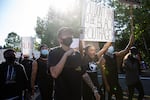
Monnie Spears leads a march from Clackamas High School to protest police brutality Wednesday, June 3, 2020, in Happy Valley, Ore. Cities across the state including Happy Valley, Eugene, Hermiston, Pendleton, Burns, Grants Pass and others joined the nationwide cry for justice in the wake of George Floyd's death in Minnesota.
Bradley W. Parks / OPB
Monnie Spears-Rogers, 20, Happy Valley
Monnie Spears-Rogers attends Weber State University in Utah, but because of COVID-19, she’s been home in Happy Valley.
Being back in the area as protests against police brutality are happening all over the world led her to organize a protest in her own predominantly white community Wednesday.
“I feel like a lot of people have really been nervous to speak out — they don’t know what to say, they don’t want to say the wrong thing, and also people have just been silent because they do not care,” Spears-Rogers said.

Bradley W. Parks / OPB
The protest started at Clackamas High School, where Spears-Rogers graduated in 2017. She said her experience as an athlete shielded her from some of what she saw other Black students go through — being unheard or misunderstood.
“I’m out there fighting for people who look like me,” Spears-Rogers said.
But she’s also calling for people who aren’t Black to speak up and be allies as well.
“We need them, we need them to speak up, and we need them to be genuine and consistent,” she said.
Hundreds, thousands even, showed up and marched, holding Black Lives Matter signs and kneeling.
“This is the first step, this is the least I could do,” Spears-Rogers said. “I’m looking at, What can I do after this?”
Isis Finn, 19, Vancouver
“For a long time I’ve been upset about things that happen to people that look like me and my siblings,” said 19-year-old Isis Finn, who is starting at Portland Community College this fall. “But watching the video of George Floyd I kept seeing my brother’s face. I feel like I have to be here so that my kids will never have to experience that.”
Finn grew up in Portland and Vancouver and remembers white kids in school calling her racial slurs or telling her she’s too angry.
“There are a lot of issues that need to be talked about,” she said. “Everybody mistook that for anger like they do most Black women. I’m allowed to be angry. I’m allowed to be sad. I’m allowed to be whatever I wanna be.”
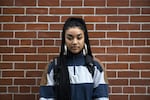
Isis Finn, 19, grew up in Portland, Ore., and Vancouver, Wash.
Jonathan Levinson / OPB
Ultimately, she wants to see the police defunded. Her father is white and her mom is Black, and Finn said her home life growing up was rocky. She remembers police being called for a welfare check on her family and sensing their indifference when they saw her mom’s and her siblings’ race.
“Putting in a new police chief or tweaking little minor things isn’t going to dismantle 401 years of oppression,” she said. “It’s time to take down this system and create a new one that is for everybody.”
Isiah Wagoner, 29, Eugene
When Isiah Wagoner saw people clustering around a Jeep that had pulled up at a Black Lives Matter march on May 31, he didn’t grasp the potentially dangerous situation at first.
“Hey, we don’t want to turn this into people bashing people’s windows in," Wagoner recalled. Just two nights before then, he and other march organizers had implored people to stop smashing in storefronts and burning dumpsters at a Eugene business complex. He argued the damage — committed mostly by young white rioters — took away from the movement’s message, and many with Black Lives Matter feared African Americans would be blamed.
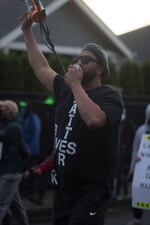
Isiah Wagoner shouts into the bullhorn at a protest march against police brutality in Eugene, Ore.
Ceara Dawn Swogger
Wagoner didn’t hear glass being shattered. What he saw alarmed him: a white man holding a semi-automatic rifle, standing outside the vehicle and facing the marchers.
“He was pointing at his gun saying, ‘There’s no clip in here and I have a 2nd Amendment right,’” Wagoner recalled.
Across the country, witnesses say armed provocateurs have shown up at protests and marches. Critics say such tactics are meant to intimidate activists more than assert gun rights.
“If people provoked him, we could be potentially be looking at a massacre here,” Wagoner said. “So let me step in, let me show this man some love, try to protect his rights, and say, ‘Brothers and sisters, if we ignore him, and we keep walking. He has no reason to do any harm to us.’”
But some others in the crowd, clearly agitated by the armed man, surrounded him and began throwing punches. Wagoner said he got caught in the surge, was hit several times, and fell on the ground with the man.
“The scariest thing I saw was two people’s hands on the assault rifle at the same time,” he remembers. “And I don’t know at that point where his magazine’s at, if it’s loaded, or what’s going on. But I’m trying to get him out of there as quickly as possible.”
Wagoner shielded the man as he got back into the Jeep. Before he drove off, Wagoner and another activist gave the man back his hat and rifle. Witnesses say the vehicle sped off, nearly hitting someone. The man has not been reported at other events since.
Supporters have set up a GoFundMe page to help pay for Wagoner’s injured back, but Wagoner has said he wants the money benefiting children in Lane County, instead.

Members of the Social Club stack supplies to distribute to demonstrators in Happy Valley, Ore., Wednesday, June 3, 2020.
Bradley W. Parks / OPB
Carlos Andres Cortés, 20 | Jafet Sotelo, 20Daniel Solorio, 21 | Hernán Juarez, 20, Portland
Hernán Juarez’s truck bed was piled high with cases of bottled water and paper bags stuffed with conchas. People came by the truck and dropped supplies next to a pile of signs emblazoned with messages like “Hate is the choice of the weak.”
Juarez, Daniel Solorio, Jafet Sotelo and Carlos Andres Cortés were among those passing out snacks and supplies to the thousand-plus marchers in Happy Valley demanding an end to police violence.
“The goal in my eyes is to create change as a community, for a community,” Juarez said.
The friends formed a collective called the Social Club in May during the dog days of Oregon's stay-home orders. The idea was to entertain people online during quarantine and "give back to people paying it forward." They've tapped a modest but active Instagram following to raise money for people in need — everyone from a medical student trying to pay for an MCAT, to an area farmworker and single mother of three who needed help paying bills.
When protests swelled in response to the police killings of George Floyd and Breonna Taylor, Solorio said the group refocused on supporting the Black Lives Matter movement.
“We have this huge opportunity to help out because we have this platform that we’ve been building,” Cortés added. “It would be a waste to do nothing.”

Bradley W. Parks / OPB
The Social Club is raising money for social justice organizations, buying supplies for demonstrators and leveraging social media to support the movement.
“What we’re doing, anyone else can do, it’s just a matter of using your voice and just doing it,” Sotelo said.
“What I wanna see happen now is everyone who believes the same way and who thinks that this movement is the right move to be finding the way that they can help ... and doing it,” Cortés added. “Because they’re just unused tools right now.”
Solorio describes the group — and the vast majority of people who have donated money and resources — as “broke college kids.”
Juarez said that shows the power of collective action.
“Collectively, as a group, you can accomplish a lot,” he said. “You’re stronger when you have people by your side.”
“We were just thinking how we never, ever imagined ever in our whole lives to be walking on Sunnyside Road with such a diverse group,” Solorio said. “It was honestly surreal.”
Cortés said he’s taken this moment to reflect on how racism intersects with his life.
“I’m a Latino boy and I feel like I’m not a racist person, but even in Latino culture there’s a lot of stuff embedded that’s pretty racist,” he said. “I have to look back into myself like, What do I believe in?”
“Instead of looking back at other people and what they’ve done,” Solorio added, “everyone’s starting to look at themselves and being like, OK, what have I done as an individual to contribute to this problem? And what can I do now to atone for that mistake?”
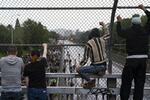
People watch from an overpass as protesters marching against racist violence and police brutality block traffic on Interstate 84 in Portland, Ore., on June 8, 2020.
Jonathan Levinson / OPB
Renee Allums, 23, Portland
Renee Allums grew up in Southern California. Now, at 23, she’s out protesting in Portland because she’s tired of being tired, she said.
“That’s sad to say, being an American, that I’m tired and I’m 23,” said Allums. “I saw my first dead body of a Black male when I was 12 years old, on TV.”
It’s particularly hard for her to see how Black people being killed has become normalized.
“Growing up seeing Trayvon Martin, Michael Brown, Sandra Bland,” she said. “It gets in the press, you get your hashtag and then it’s on to the next, over and over and over again.”
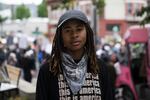
Renee Allums, 23.
Jonathan Levinson / OPB
Allums hopes these protests will push people to demand big changes.
“When I say build something better, I want to burn it all and dismantle everything and just start over again,” she said. “I love sci-fi and I believe that you dream it and then you do the work to make it happen.”
She worries, however, that the outpouring of white support might evaporate when big changes like defunding or abolishing the police are put on the table.
“I hate to say this,” Allums said, “but a lot of white liberals like to stick their feet in but when it’s time to jump all the way in they’re like, ‘I don’t know about that.’ But that’s honestly what it takes.”
Leah Wick, 14, Lake Oswego
Leah Wick is an incoming freshman at Lakeridge High School in Lake Oswego. She said she went to a recent protest there last Friday because she wanted to support people of color -- including those living in and outside of her mostly white city.
“It’s important that they feel welcome … and it’s important that everyone gets justice,” Wick said. “We’re all human, we should all be treated equal.”
Hundreds came out to the Lake Oswego protest. One carried a sign that said “I’m listening, I’m learning.”

Bradley W. Parks / OPB
Wick has seen the videos of police brutality, so when her friends asked if she’d join them at the protest, she said yes. It felt to her like a way to show her support.
“It doesn’t feel right to not doing anything about it,” Wick said. “Posting on social media just doesn’t seem like enough, in my opinion.”
Wick called the protest peaceful and inspiring — she said she heard different stories and perspectives. She and her friends even spoke. As a young person, she sees her generation as the one to bring change.
“Just because you’re young doesn’t mean you can’t have a voice, or that you’re too young to understand, or that your voice doesn’t matter,” Wick said.
“We can still speak out about it and we can still make a difference.”
Elizabeth Renguso and Sophia, 17, Portland
Elizabeth Renguso and her 17-year-old daughter, Sophia, stood in the field at Revolution Hall, where protesters have started every evening with a handful of speakers before marching throughout the city. Elizabeth said she’s been doing anti-racism work for decades.
When she fought against apartheid in South Africa, people there told her she should be fighting racism back home.
“I know,” she would reply. “I’m here to learn from you.”
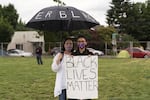
Elizabeth Renguso and her 17-year-old daughter, Sophia, hold a sign during a protest at Revolution Hall, in Portland, Ore.
Jonathan Levinson / OPB
Elizabeth said she wants to see government institutions dismantled so we can start fresh.
“From the bottom up, we need new leaders,” she said. “We need better representation. We need people from the community involved in the decision making and moved into leadership positions.”
Her daughter Sophia, who is half Salvadoran, said she sees a lot of prejudice around her and that she hopes recent momentum will continue.
“I’d say I’m hopeful,” Sophia said. “I think we need to put more of the resources that are going to the police into other areas to prevent crime instead of punish it.”
Bocha, 24, Portland
Bocha is a local hip-hop artist born and raised in Portland. He’s been out protesting every day since protests started in Portland at the end of May.
“I’m out here to push the movement as far as us against the blue,” he said, referring to the police.
Bocha says systemic racism is much deeper than the police but they’re a good starting point for change.
“They don’t see themselves as part of the community,” he said. “They feel like they are higher than us and I feel like our job is to tell them that you are one of us if you choose to be and if not you are against us. I feel like if we continue to have conversations and continue to put our foot on their necks, maybe something will come out of it.”
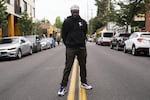
Bocha is a local hip-hop artist born and raised in Portland
Jonathan Levinson / OPB
Looking around at the crowd gathered at Revolution Hall, Bocha said he’s been surprised to see so many white people show up but that it’s been a blessing.
“I know a lot of the people that run this city are against me,” he said. “But as far as the community, the people I see every day on the bus and in the supermarket, they’re the ones out here with us. They’re the ones stepping in front of me when the police are stepping to me and I appreciate that.”
He said he’s seen some positive change in the past two weeks and while they’re baby steps, he said it’s a start.
